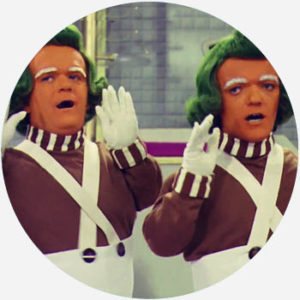Fictional Characters dictionary
Oompa Loompa
Who are the Oompa Loompas?
Oompa Loompas are a fictional group of workers from the children’s book Charlie and the Chocolate Factory by Roald Dahl.
Where does Oompa Loompa come from?

The Oompa Loompas come from Roald Dahl’s 1964 children’s classic Charlie and the Chocolate Factory and appear in the book’s 1971 and 2005 movie adaptions. They are a diminutive people with peculiar hairstyles who work in Willy Wonka’s fanciful chocolate factory. They sing songs throughout the story, particularly detailing the shortcomings and mistakes of each child that comes to the chocolate factory in a special visit in the story.
Perhaps the most memorable presentation of the Oompa Loompas was in the 1971 film adaption Willy Wonka and the Chocolate Factory, starring Gene Wilder as Willy Wonka. In this incarnation, the Oompa Loompas were played by short-statured actors wearing orange body paint and green wigs, with their eyebrows painted white. In the film, the Oompa Loompas open their first song with the now iconic lyrics: “Oompa loompa doompa-de-doo / I have a perfect puzzle for you.”
Author Roald Dahl is known for his colorful coinages (e.g., gobblefunk, whizzpopper), and his name Oompa Loompa is no exception.
Examples of Oompa Loompa
Who uses Oompa Loompa?
Especially since the 1971 film, the moniker Oompa Loompa has gone on to demean a person of short stature or a bustling factory worker. Thanks to their distinctive orange skin in the film, Oompa Loompa also ridicules someone whose skin looks orange-colored, especially as the result of a bad spray tan or poorly-chosen foundation. Oompa Loompa is an offensive term to call a person with dwarfism.
Dahl’s original 1964 Oompa Loompas are the subject of some racial controversy. Although Dahl describes the characters as light-skinned and blonde-haired in later editions of the book, he initially depicted them as Pygmy people brought from Africa as slaves to work in Wonka’s factory. He also uses imagery which calls to mind a vague and generic archetypical African landscape. Some have suggested that this imagery is a deliberate satire of exploitative colonialist labor practices. Others point out the discomfiting parallels to real-world slavery and the underlying imperialist narratives in the relationship between Willy Wonka and the Oompa Loompas.
Note
This is not meant to be a formal definition of Oompa Loompa like most terms we define on Dictionary.com, but is rather an informal word summary that hopefully touches upon the key aspects of the meaning and usage of Oompa Loompa that will help our users expand their word mastery.